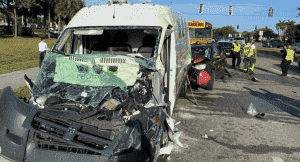
Catastrophic injuries represent the most severe and life-altering consequences of car accidents, fundamentally changing a victim’s ability to work, care for themselves, and enjoy life as they once did.
These cases demand a significantly different approach than typical personal injury claims, requiring sophisticated legal strategies and a comprehensive understanding of long-term medical needs.
A Miami car accident lawyer with experience in catastrophic injuries in Miami car accident cases can help you secure appropriate compensation for lifetime care and support. The stakes in catastrophic injury cases are extraordinarily high. Any catastrophic injury is a case where you must have a lawyer’s help.
Understanding Catastrophic Injuries in Miami Car Accidents
Catastrophic injuries are distinguished from other injuries by their permanent, life-altering nature and the extensive medical treatment they require. These injuries fundamentally change a person’s life, often requiring lifelong medical care, rehabilitation, and assistance with basic daily activities.
Common catastrophic injuries from Miami car accidents include traumatic brain injuries, complete or incomplete spinal cord injuries resulting in paralysis, severe burn injuries covering large portions of the body, multiple traumatic amputations, and crushing injuries that cause permanent organ damage or failure.
These injuries typically prevent individuals from returning to their previous employment, require extensive modifications to their living environment, and necessitate ongoing medical supervision and care.
Documenting Catastrophic Injuries
Catastrophic injury cases require extensive medical documentation that goes far beyond typical accident injuries. The medical record must establish not only the current extent of injuries but also provide detailed prognoses for future medical needs, functional limitations, and life expectancy considerations.
The full extent of catastrophic injuries often isn’t apparent for months or even years as the victim’s condition stabilizes and medical professionals can better assess permanent limitations. This delay to reach maximum medical recovery can make these cases take a long time to resolve.
Comprehensive medical evaluations involve multiple specialists, including neurologists, orthopedic surgeons, physiatrists, occupational therapists, and neuropsychologists. Each specialist contributes crucial information about different aspects of the victim’s condition and future needs, creating a complete picture of the catastrophic injury’s impact.
Life Care Planning and Future Medical Needs
Life care planning represents one of the most critical aspects of catastrophic injury cases, involving detailed analysis of all future medical, rehabilitation, and care needs throughout the victim’s lifetime. These plans serve as the foundation for calculating appropriate compensation amounts.
Professional life care planners work with medical teams to develop comprehensive plans that address ongoing medical treatment, necessary medical equipment, home modifications, transportation needs, and personal care assistance. These plans must account for the victim’s changing needs as they age and potential complications that may arise over time.
The life care plan becomes a roadmap for the victim’s future, ensuring they receive appropriate care while also providing the legal framework for calculating damages. Insurance companies often challenge these plans, making expert testimony crucial for defending the necessity and reasonableness of projected future care needs.
Expert Witness Testimony and Case Development
Catastrophic injury cases rely heavily on expert witness testimony to establish the full extent of damages and future needs. Multiple types of experts typically contribute to these complex cases, each providing specialized knowledge that helps the jury understand different aspects of the victim’s situation.
Medical experts explain the nature and extent of injuries, treatment requirements, and long-term prognosis. Economists calculate lost earning capacity and the present value of future medical expenses. Life care planners detail ongoing care requirements and associated costs.
Additional experts may include vocational rehabilitation specialists, architects who design accessibility modifications, and mental health professionals who address the psychological impact of catastrophic injuries. The coordination of expert testimony requires careful planning to present a cohesive narrative about the victim’s needs and losses.
Calculating Comprehensive Damages in Catastrophic Cases
Damage calculations in catastrophic injury cases involve complex financial modeling that accounts for decades of future expenses and losses. Unlike typical car accident cases, catastrophic injury damages often reach into the millions of dollars due to lifetime care requirements.
Economic damages include past and future medical expenses, lost wages, lost earning capacity, home modifications, specialized transportation needs, and ongoing care costs. These calculations must consider inflation, changes in medical technology, and the victim’s life expectancy to ensure adequate compensation throughout their lifetime.
Non-economic damages such as pain and suffering, loss of enjoyment of life, and loss of consortium take on heightened significance in catastrophic cases. The permanent nature of these injuries means victims endure ongoing physical and emotional suffering that traditional damage calculations may not adequately address.
Insurance Coverage and Policy Limits Challenges
Catastrophic injury cases often exceed available insurance coverage. Florida’s minimum insurance requirements are woefully inadequate for catastrophic injuries, making it essential to identify all available sources of compensation.
Multiple insurance policies may apply to a single catastrophic injury case, including the at-fault driver’s liability coverage, underinsured motorist coverage, medical payments coverage, and potentially commercial policies if business vehicles are involved. Each policy may have different terms, conditions, and coverage limits that affect the victim’s recovery.
When insurance coverage is insufficient, attorneys must explore other avenues for compensation, including the at-fault party’s assets, potential claims against multiple defendants, or identifying additional responsible parties.
Specialized Legal Strategies for Maximum Recovery
Catastrophic injury cases require specialized legal approaches that differ significantly from standard personal injury litigation. The complexity of these cases demands attorneys with specific experience in handling severe injury claims and an understanding of the medical, financial, and practical challenges victims face.
Early case development is crucial in catastrophic injury cases, as evidence preservation, expert retention, and comprehensive damage assessment take considerably more time than typical cases. Attorneys must work quickly to secure accident scenes, obtain surveillance footage, and begin building relationships with the medical team treating the victim.
Settlement negotiations in catastrophic injury cases often involve structured settlements, Medicare set-asides, and other complex financial arrangements designed to protect the victim’s long-term interests while ensuring ongoing eligibility for any government benefits.
The Role of Family and Caregivers in Catastrophic Cases
Catastrophic injuries don’t just affect the victim—they fundamentally alter the lives of family members who often become full-time caregivers. Florida law recognizes these impacts through loss of consortium claims and other damages that account for the broader family impact of catastrophic injuries.
Family members may be entitled to compensation for their losses, including the need to leave employment to provide care, the emotional trauma of witnessing their loved one’s suffering, and the loss of the relationship they once enjoyed with the victim. These claims require careful documentation and sensitive handling.
The involvement of family members also complicates case management, as legal decisions must consider not only the victim’s immediate needs but also the long-term impact on family dynamics, financial stability, and caregiving responsibilities that may last for decades.
Moving Forward After Catastrophic Miami Car Accident Injuries
Recovering from catastrophic injuries after a Miami car accident involves a lifetime journey of adaptation, medical care, and legal advocacy to ensure victims receive the resources necessary for the best possible quality of life. The legal process becomes a foundation for this journey, providing the financial security needed for ongoing care and support.
The importance of experienced legal representation cannot be overstated in catastrophic injury cases, where a single mistake in damage calculations or settlement negotiations can leave victims without adequate resources for their lifetime needs.
At Anidjar & Levine, our legal team has extensive experience handling catastrophic injury cases throughout Miami and understands the unique challenges these victims and their families face. You pay nothing unless we recover compensation for you. Call us today for a free consultation to discuss your catastrophic injury case.










